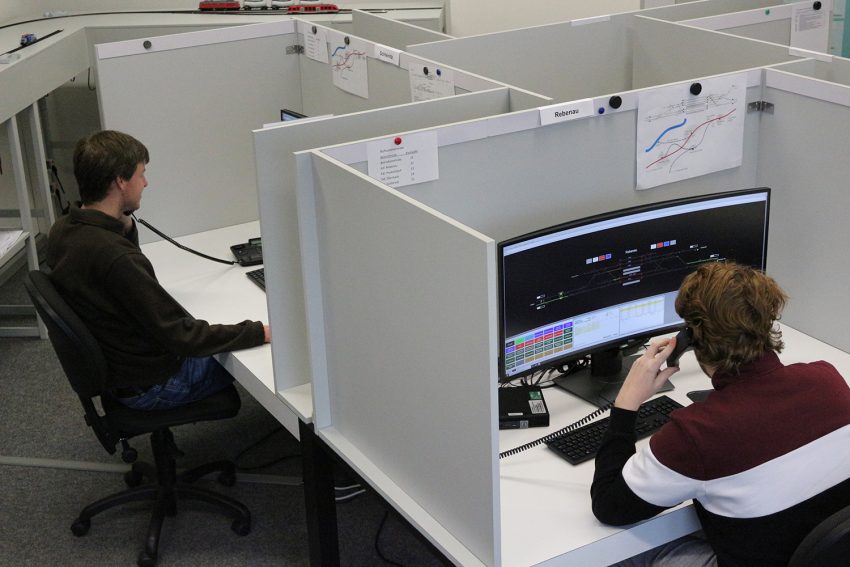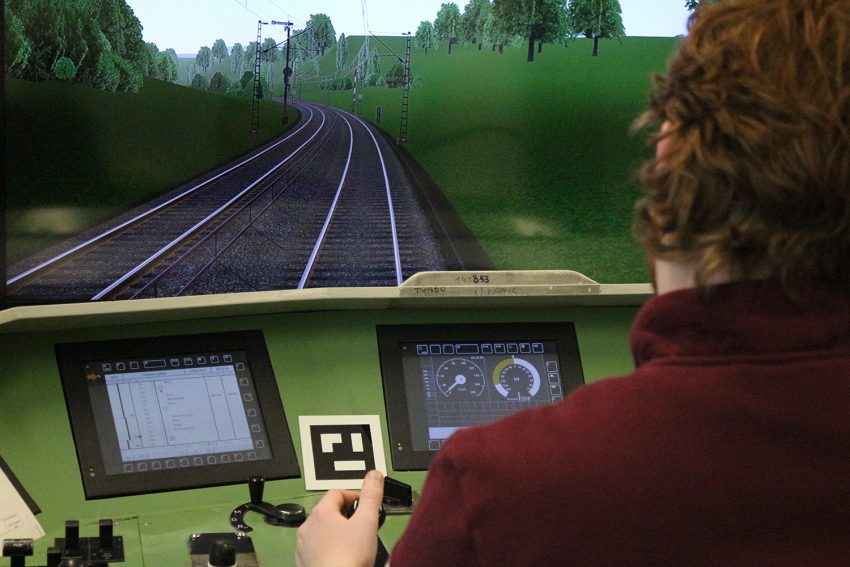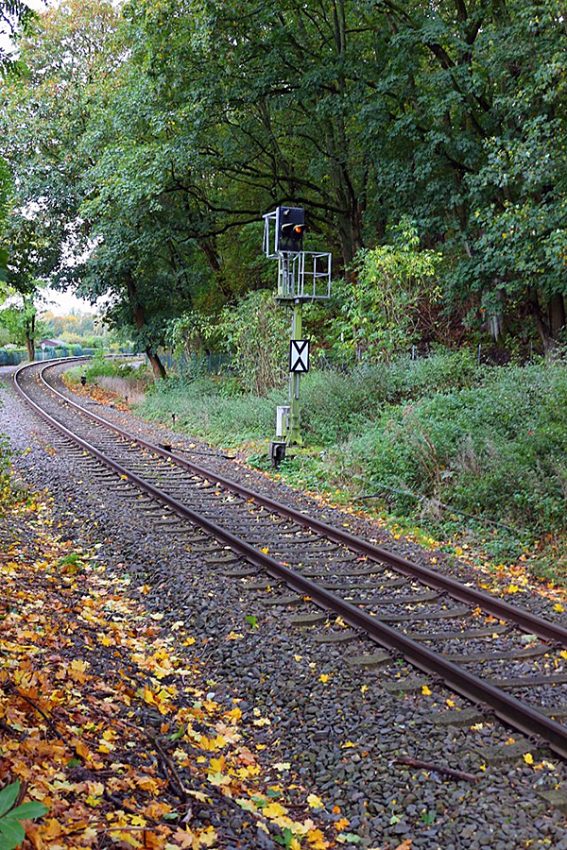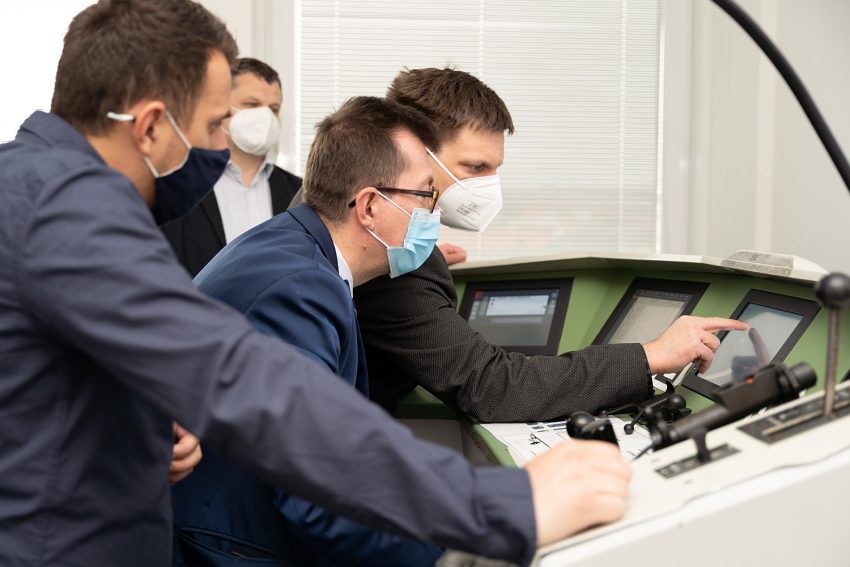From digitalisation to internationalisation A virtual laboratory and AR technology to teach railway systems engineering
To this day, railway systems and their operating procedures, rules and terminology tend to be very country-specific. So much so that university-level teaching in this area is often mired in this way of thinking. But a new set of digital features is poised to correct this and help create a new understanding of railway systems in other nations. And the virtual railway operations laboratory at TU Braunschweig’s Institute of Railway Systems Engineering and Traffic Safety (IfEV) is at the heart of these new developments.
Instruction in railway systems engineering has a long-standing tradition at TU Braunschweig. The first Chair of Traffic and Railway Systems was established in 1925, and the IfEV was founded in 1951. Since then, the institute has made a name for itself in the region and beyond as a strong reference in the field of railway technology. In addition to the institute’s research focus on railway operations and railway safety technology, digital teaching methods have an important role to play.
Learning from simulated rail operations
Central to teaching at the institute is the virtual railway operations laboratory, which encompasses two facilities.The first is a real-time simulator of a small rail network which can be operated from five workstations functioning as a control centre. Four students take on the roles of traffic controllers while the supervisor acts as dispatcher. Each traffic controller is responsible for one sector of the network and is tasked with directing virtual trains to neighbouring sectors. The dispatcher keeps an eye on the entire network, coordinating traffic and track loads.
The lab’s second facility is a driving simulator with an original train driver’s cab, equipped to simulate travel on virtual railway lines across Germany and Austria.

Students take on the role of traffic controllers in an abstract simulation. Photo credit: Institute of Railway Systems Engineering and Traffic Safety / TU Braunschweig
“The lab was created as a support for lectures in the areas of railway operations and safety technology. The contents of the classes can get quite abstract, so this provides an opportunity for hands-on demonstrations”, says Professor Jörn Pachl, Head of the Institute of Railway Systems Engineering and Traffic Safety. Traditionally, universities use tangible railway operating fields – actual model rail networks – for exercises. Since no such model is available at TU Braunschweig, and field trips to existing model railway networks would not offer the level of experiential teaching the university wants to provide, the idea of a virtual railway operations laboratory was born. The lab has now been up and running since 2012 and is constantly being expanded and adapted.

The virtual lab’s driving simulator lets students drive trains on many routes throughout Germany and Austria. Photo credit: Institute of Railway Systems Engineering and Traffic Safety / TU Braunschweig
Augmented reality for additional support
To provide students with tangible presentation materials as a complement to its lectures, the institute offers tours of railway infrastructure such as Gliesmarode Station in the east of Braunschweig. Augmented reality (AR) is used to provide additional visual content. Students download the tour and the associated app onto their smartphones and explore the station on their own. “Think of it as a kind of Pokémon hunt”, explains Professor Pachl, referring to the popular AR game Pokémon Go. To create the tours, the institute’s team inserted virtual objects relating to specific lectures at various locations inside the physical station, asking students to go and find them with their smartphone cameras. If a camera captures an object like a rail crossing or yard limit sign, the visual content pops up on the screen and provides additional information. To further demonstrate and reinforce class content, the institute has also created interactive tutorial videos featuring quizzes which can be used during lectures.
What was first meant only as a minor teaching aid soon became so popular with students that the IfEV decided to make the digital extras a permanent fixture in the curriculum. And the results speak for themselves. As Professor Pachl puts it, “This type of knowledge transfer, in an interactive digital environment, is extremely effective. We were able to condense some lectures, since the students now go out and acquire knowledge through actual experience”. Simon Söser, a research assistant at the institute, talks about the next stage in the teaching concept: “Driving a train in a simulator is more instructive than a video quiz. Still, the quiz helps to consolidate what you have learned. I think a good way to incorporate the digital components would be to follow up the lecture with a session in the driving simulator and to let students test their knowledge in the video quiz before taking an exam.”

The AR tour gives students real-world context for lectures, like this railway signal at Schmiedekamp. Photo credit: Institute of Railway Systems Engineering and Traffic Safety / TU Braunschweig
First successful application for a strategic Erasmus+ partnership
Not only does the IfEV serve as a role model in the field of digital teaching, but it is also a pioneer when it comes to internationalisation in railway systems engineering. Here again, the virtual lab plays a decisive role. In response to the EU’s call for proposals to foster digital education under the Erasmus+ programme, the IfEV submitted a successful application together with the University of Zagreb in Croatia and the University of Žilina in Slovakia. The aim of their joint proposal, named IDEALCAREL, is to change the way railway systems engineering is taught, taking the traditional, strong national focus and broadening it into a European research network. According to Professor Pachl, “In the IDEALCAREL Erasmus+ project, we are currently working with the University of Zagreb and the University of Žilina to find technical solutions and teaching concepts that will connect the various railway operations labs and their virtual and physical components via the Internet. We want to enable transnational online sessions, opening up completely new learning experiences for our students.”
“Key Action 2 of the Erasmus+ call for proposals focuses on strategic partnerships. This area is extremely competitive”, says Francesco Ducatelli, TU Braunschweig’s Erasmus+ Coordinator. “Only 15 to 20 percent of all applications are successful. So I am particularly pleased that the IfEV came out ahead and secured TU Braunschweig’s first strategic Erasmus+ partnership.” The project will receive funding from the DAAD between March 2021 and February 2023. Because of COVID-19, exchanges between the universities have been mostly online thus far. It took until April 2022 before Professor Pachl and his team were able to welcome their international colleagues to Braunschweig in person. Further meetings in Zagreb and Žilina are to follow. “Throughout this project, we want to develop reusable concepts and teaching materials that other universities can then adapt to their needs, providing new and innovative approaches for the entire educational sector”, remarks Professor Pachl about the project’s aims. “Creating international links is key”, he adds, “which is why it is all the nicer to finally be able to meet in person”.

TU Braunschweig presents its railway operations lab during the first meeting of IDEALCAREL project partners. Photo credit: Daniel Götjen/TU Braunschweig
Establishing “mental interoperability”
IDEALCAREL is not the IfEV’s only international cooperation. As part of a teaching exchange with Mahidol University in Bangkok, a virtual railway operations laboratory was set up in support of lectures on safety technology and scheduling. Following Braunschweig’s model, it features several traffic controller workstations where students can control a simulated rail network’s operations under real-time conditions. The simulation was adapted to reflect the characteristics of the Thai railway network.
Reciprocal visits between the international project partners and the joint set-up of operations laboratories are important first steps towards internationalisation in this highly country-centric field. Technical interoperability – adapting the technical features of a country’s railway network to an international norm – plays only a minor role in this. The most important point is to reach a sort of “mental interoperability” between actors in international railway systems engineering. For Professor Pachl, it is clear what this means: establishing personal ties and gaining a better understanding of the underlying principles of different domestic railway systems.
